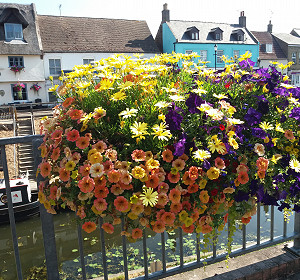Usk in Bloom, a group that has won the Wales in Bloom Large Village category consecutively for the past 36 years, is now making efforts to help pollinators.
Because of their commitment, the group has become the first organisation to receive the Welsh Government’s Caru Gwenyn (bee friendly) award. The initiative is the first of its kind and was set up by the Welsh government in partnership with Friends of the Earth Cymru to protect bees and other pollinators in Wales.
The award is part of the country’s pollinator strategy and is open to schools, public bodies, councils, businesses and places of worship that encourage the protection of bees and other pollinators.
To receive the award, there are four criteria that are judged: providing pollinator-friendly food sources, places for insects to live, chemical-free surroundings, involvement by the community and explaining the importance of helping pollinators to people.
Located in south Wales, the town of Usk has introduced pollinator-friendly practices such as switching to single (instead of double) flowered plants and choosing plants that are as appealing to pollinators as they are to us.
Why do we need pollinators?
Pollinators are animals (bees, birds, butterflies and other insects and small mammals) that fertilise plants, resulting in the formation of seeds and the fruit surrounding seeds, ensuring that a new generation of plants can be grown.
It is mutually beneficial to pollinators and plants - but also important to humans. Without pollinators, agricultural economies, food supplies and surrounding landscapes would suffer.
Britain in Bloom
Amongst the three areas that Britain in Bloom judges focus on is environmental responsibility. Judges look for evidence of entrants addressing a range of environmental issues including conservation, littering, maintaining wildlife’s natural habitats and recycling. Showing a commitment to improving pollination is crucial to conservation and maintaining natural habitats.
The RHS has also compiled plant lists to help gardeners identify pollinating plants to attract bees. Click here to find out more.
Amberol work with Britain in Bloom entrants from all over the country, helping organisations to create displays that attract a range of pollinators, particularly the bumble bee which is has a declining population. Find out how we can help to improve your public space here or call us on 01773 830 930.






